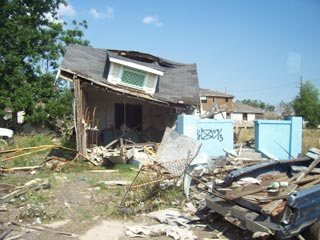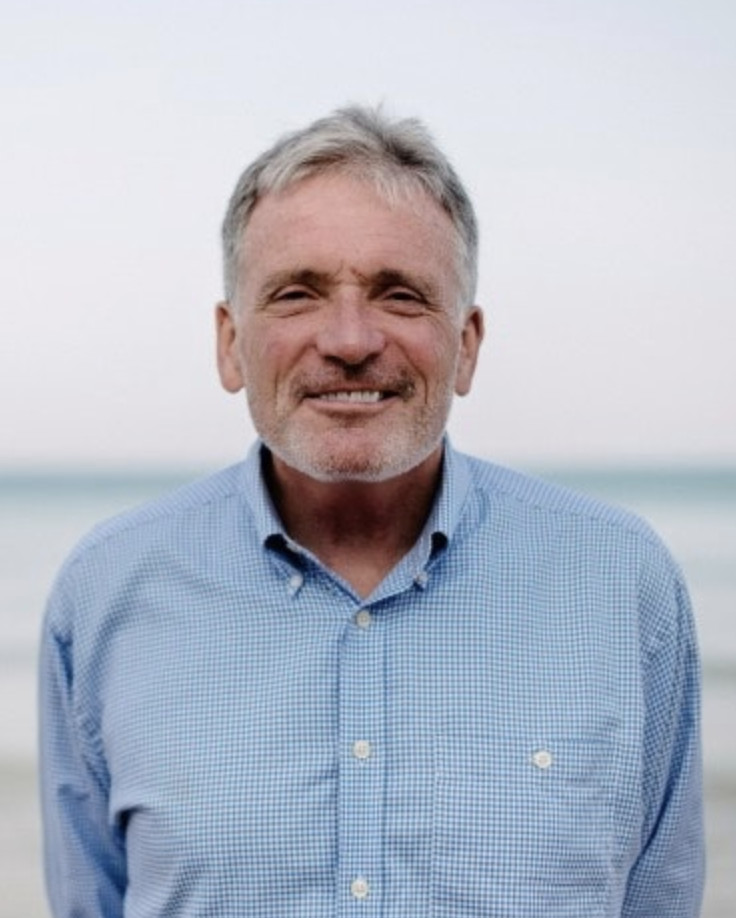by Douglas J. Brouwer
Early on the morning of August 29, 2005, Hurricane Katrina, the sixth-strongest hurricane ever recorded in the Atlantic, came ashore just east of New Orleans and brought with it a 21-foot flood surge.
Many homes in the area survived the wind and rain, only to be wrecked by a crushing wall of water. In just a couple of hours, the old and improperly built levee system in New Orleans essentially collapsed, and thousands of homes were destroyed or damaged beyond repair. At least 1,836 people lost their lives in the first days after the storm hit, and 705 people remain unaccounted for. An estimated $81.2 billion of damage was caused, making it the costliest disaster in United States history. And today, it is estimated, New Orleans has less than half of its pre-storm population.
I watch cable news, so thought myself well-informed about Katrina and the devastation along the Gulf Coast. I organized an adult discussion group at the church, for the Sunday following the disaster, to assist anyone who wanted to process the troubling news images of floating bodies or the chaos at the Superdome. Beyond that, our church made substantial gifts to Presbyterian Disaster Assistance and helped to resettle an older woman and her special needs son, who (when I met them and listened to their story) seemed understandably traumatized by their experience.
I felt good about what we had done.
But that was a long time ago, nearly a year and a half, and in a culture of evershorter news cycles, I was soon absorbed by other matters, including some closer to home, such as the closing of Pfizer plants in Michigan, a decision that has created a devastation of another kind.
So, it came as quite a shock to me to go to New Orleans in February with our church’s youth group and to tour the areas affected by the hurricane and the flood that followed. I wasn’t prepared for the scale of the disaster or the desolation of the areas most affected.
As our group drove around in its 15-passenger van, a sort of ubiquitous vehicle for church groups such as ours, we passed block after block, mile after mile, of neighborhoods, once presumably teeming with life, now eerily silent. It appears that what remained of many homes had already been demolished and hauled away, leaving their cement slabs exposed. Other homes, inexplicably, still stand– sort of–many off their foundations, most in various stages of falling apart.
Our group, normally noisy, usually with the radio at (what seemed like) full volume, was suddenly quiet as we drove along. The faces of the high school students were turned, as was mine, to the windows of the van. Some members of the group had been in the area the previous June and shouted when they saw a house whose owners they had personally helped. But the shouts quickly turned to silence again when they discovered that little had changed since they last visited.
Navigating our way through the Lower Ninth Ward was difficult because most street signs had disappeared. It wasn’t clear whether the signs had been swept away in the flood or, more disturbingly,
|
Whether or not I am optimistic by nature, I am clinging to my faith that God will do this. I believe. |
had been taken as souvenirs. Either way, they were gone. A few people seemed to be existing there–one could hardly call it living–in trailers supplied by FEMA, and they had thoughtfully nailed handlettered street signs to telephone poles.At one point the group decided to stop the van and get out for a walk. Reminders were given about not touching anything. In our orientation the previous evening we had been duly warned about continuing hazards in the area. “Black mold” was mentioned, and though I have no idea what it is, it does have an ominous sound to it.
During our walk our footsteps echoed, and we didn’t meet a single pedestrian, but we did come across a house or two that had clearly been restored or rebuilt. In front of these homes were signs with the words “We’re back.” The sight brought a sudden rush of tears to my eyes, and I wasn’t at all sure why. My best guess, looking back, is that those two words– “We’re back”–expressed unexpected hope and courage. I could not personally imagine returning to this neighborhood, even if I had spent my entire life there. My first impulse, after wiping away my tears, was a desire to meet these people, shake their hands, and express my encouragement and admiration.
But, as I mentioned, there didn’t seem to be anyone around, and when I reflected on my reaction later, I realized that the words “We’re back” could simply have meant “We have nowhere else to go,” or “We tried living with family out of town, but that didn’t work out.” Actually, the words “We’re back” could have any number of meanings, and in the end I will never know for sure. I wanted so badly, at the time, to find something, anything, that seemed hopeful about the future.
Outside the remnants of one church in the Lower Ninth Ward–and we passed a surprisingly large number of them–we found a signboard with the date “Aug 28” and a promise of a “massed choir.” It’s unclear whether services were actually held there that day or not. The storm would not come ashore for nearly 24 hours. Maybe on that Sunday morning the parishioners were already making plans to leave. Maybe they went to church and prayed in spite of the hurricane warnings. And heard a “massed choir.” If a choir sang, it could not have amounted to more than 75 people. The entire church, in fact, could not have held more than 75 people. I would like to think that they gathered one last time to sing. And pray. At another crumbling church, we found near the front door a hand-lettered sign from someone (the pastor?) who apparently still has hopes of rebuilding a church on the site. Toward the top of the sign were the words “Can these bones live? ” A nd then, in slightly smaller letters, were the familiar words from Ezekiel, which I would never have thought to apply to this situation and which I now will always associate with it: “O dr y bones, hear the word of the Lord. Thus says the Lord God to these bones: I will cause breath to enter you, and you shall live. I will lay sinews on you, and will cause f lesh to come upon you, and cover you with skin, and put breath in you, and you shall live; and you shall know that I am the Lord.”
I suppose that by nature I am not an optimistic person, and I don’t know that I’ve ever admitted that before. And it strikes me as I type those words that I don’t like the look of them. I would like to be optimistic. I would like to be a great deal more optimistic than I often am. See that glass of water? Yeah, I’d say. It’s half full. That’s the sort of person I’d like to be, and how I want others to think of me.
But the truth is, I tend to see in things what might go wrong. I see problems, and I tend to see them faster than other people. It’s my gift, I suppose–to see what’s not right about a situation. Some people I know make a good living off a gift like mine. Risk management seems to be a growth industry right now. A risk manager looks over your business (or church) and identifies all the areas where you are vulnerable. Where you might get sued. A good risk manager wants to limit your exposure.
I suppose I could have gone into this area, but some years ago I discerned a call to ministry.  And so I am not in the growing field of risk management; I am instead in the somewhat precarious business of hope, proclaiming and urging hope when all around me I see reasons for despair.
And so I am not in the growing field of risk management; I am instead in the somewhat precarious business of hope, proclaiming and urging hope when all around me I see reasons for despair.
It’s an odd business to be in, I’m afraid, this business of hope.
Because the news is often difficult to hear, several people I know say that they no longer listen. They would prefer to be unaware of what it is happening in the world, rather than depressed by continuing reports of violent crime, bombings, death, melting polar ice caps, shrinking glaciers, and the like. I continue to read the newspaper–two of them, actually– and, as I mentioned, I also watch cable news. Not because I find any of it edifying, but because ignoring it, I realize, won’t make it go away.
My faith tells me to be hopeful about the future–not the immediate future, maybe, but the future. One day, maybe not tomorrow or the next day, but one day creation will be restored to the way it was meant to be. That day seems to be a long way off. Even on a good day. I’m beginning to realize that that day will not occur during my lifetime.
But that day, my faith tells me, is coming–a day when there will be peace, within and without, a day when people won’t worr y about their children, a day when risk managers will be looking for other kinds of work. That day is coming. A nd whether or not I am optimistic by nature, I am clinging to my faith that God will do this. I believe. In spite of all the evidence to the contrar y, in spite of what I saw in New Orleans in Februar y, in spite of what I read and see in the news, I believe that God will not let us down. Mostly what I believe is that these bones will live.
Hear the word of the Lord.

